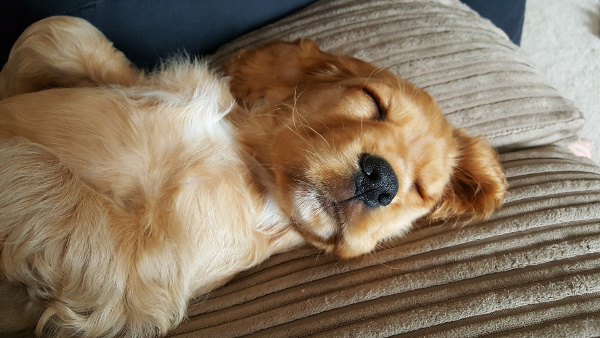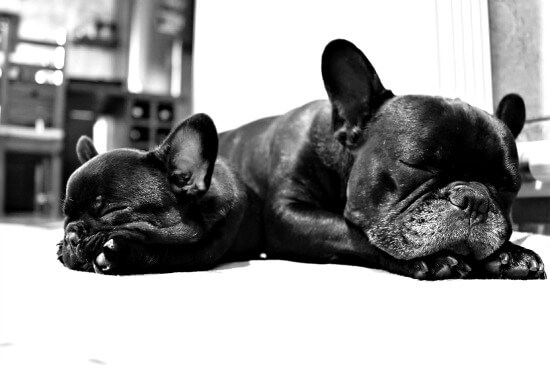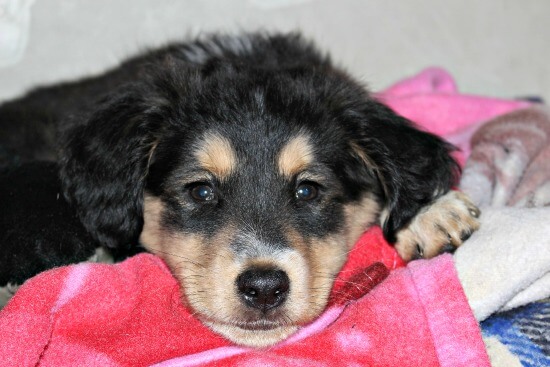FYI: If you buy something through a link on this site I may earn a commission - at NO extra cost to you.
Why Is My Puppy Breathing Fast?
A puppy breathing fast, or erratically, can sometimes make you worry.
Abnormally fast breathing is called Tachypnoea, and it can happen for a lot of reasons, some totally benign, others that need to be evaluated by a veterinarian.
While your puppy might seem as if he's breathing way too quickly, it can also sometimes look as though he's holding his breath, or that his breathing is very irregular.
Combine
this with the normal twitching, wriggling and even whining or barking
that a many puppies indulge in when they're dreaming and it can be 'panic
stations' for the human members of the family.
I get many questions about this sort of situation, and the good news is that generally a puppy breathing fast is nothing to worry about.
But sometimes there is a problem, so it's important to know what is normal for puppies, what simple things can trigger rapid respiration that isn't a concern, and when something could be wrong requiring a vet evaluation or treatment.

Normal respiration rate for puppies....
All puppies are different, but as a general guideline, the average breathing rate (aka respiration rate) for a puppy is somewhere between fifteen and forty breaths per minute when at rest.
As you're most likely to notice your puppy's breathing when he's sound asleep this is a good reference point to have.
You can time his breaths by this using your cell phone, stopwatch, smartwatch of just a clock and it may give you peace of mind.
- Why is my puppy breathing fast when he's asleep?
- If my puppy is breathing fast does it mean he's sick?
- What can cause a puppy to breath fast?
- See what a veterinarian has to say about rapid breathing in puppies
- Reverse sneezing and hiccups
Puppy breathing fast or irregularly when asleep.
Let's start with the way your puppy behaves when he's deeply asleep.
Young puppies are basically tiny babies, and they're either eating, playing, eliminating or sleeping... and sleeping takes up more time than any other activity.

Sleep is very important to puppies as it's when
their little bodies do most of their growing and developing, so it's
natural that it will be one of their favorite pastimes.
But puppies don't necessarily sleep in that 'dead to the world' way that some mature and older dogs do.
They may twitch, jerk or 'wriggle', whine or even bark..... and their breathing may seem very fast, or slow and shallow, or appear to 'stop-and-start' as if they're holding their breath.
This is because when puppies are sleeping they spend a lot of that time dreaming. They may dream of racing with their siblings, chasing a ball or butterfly, playing tug-of-war with their human etc. etc. Their bodies react by increasing the pups respiration rate as if they actually WERE running around.
If you're a mom or have spent much time around newborn human infants, you'll know that babies act the same way.
A puppy breathing fast, or taking erratic breaths, twitching, wriggling or whining is all quite normal, and usually nothing to worry about.
Once he wakes up his breathing will most likely return to normal very quickly. If it doesn't or you see any of these symptoms in your pup then a vet check is recommended.
If my puppy is breathing fast is he sick?
I'm not a veterinarian and I can't tell you for sure that your puppy is 100% healthy, or whether or not he has any problems that are related to the way he's breathing when he's asleep....
BUT if he is:
- Happy
- Active
- Eating normally
- Drinking normally
- Up to date on his vaccinations
- Up to date on his parasite treatment
- Is showing no other signs of illness
..... then chances are good that little Fido is just fine.
However, a puppy who has difficulty breathing when awake, or shows any other signs of illness could be different story.

Causes Of rapid respiration in puppies
The most common causes of increased respiration (ie breathing faster than normal) in puppies when awake include:
- Exercising
- Getting hot
- Being stressed or excited
Within normal limits none of these are a cause for concern (but getting too hot can cause heat exhaustion or heat stroke, so don't overdo it outdoors in hot weather)
However, sometimes there can be more sinister reasons for a puppy to have an elevated respiration rate.
Occasionally a puppy will be born with a heart or circulatory problem and this may cause his breathing to be extra fast, or shallow, as well as a number of other symptoms such as tiring easily, failing to grow or put on weight at a normal rate.
In puppies other than newborns or those with congenital problems, panting or fast/irregular breathing could indicate illness or disease, including:
- Heart irregularities
- Lung disease
- Poisoning
- Severe dehydration
- Internal blockages
- Infection (primary or secondary)
It's important to note that increased respiration is rarely the ONLY sign of trouble in any of these situations, or more generally.
Other symptoms are likely to also be seen, such as:
- Lethargy
- Loss of appetite
- Vomiting and/or diarrhea
- Coughing
- Runny nose
- Pale or blue gums/lips/tongue
- Low or high body temperature (a pup's normal temperature taken rectally is somewhere between 1ooF and 102.5F... If your puppy is at 103F or higher he has a fever).
If your puppy is breathing fast, or erratically, when AWAKE, and has any of these symptoms, get him examined by a veterinarian right away:
- 'Failure to thrive' this basically means that your pup isn't growing, developing or gaining weight like other puppies of his age/breed. He may also get tired more quickly than normal
- He breathes very fast when awake, even if he's just resting. If your pup or dog breathes rapidly continuously, or intermittently while showing signs of being upset or unwell then he needs to be seen by a vet.
- He gets tired more quickly than he used to, sleeps more, or just lies down (even almost collapses) after light exercise or a short walk
- If he has a chronic cough, especially when he's lying down or when he first wakes up from a nap, or in the morning. A chronic cough that is more noticeable when your dog is lying down or first thing in the morning could mean that his heart isn't working as well as it should
- He has a swollen belly. This is one that you shouldn't panic about if your pup seems healthy otherwise, but if your pup is always seems to be tired, breathes strangely, has lost his appetite, has a cough, or any other symptoms of illness AND his tummy is distended, get him a vet check asap
Abnormal Puppy Breathing - A Veterinary Viewpoint
Compared to adult dogs, puppies are more likely to develop severe upper respiratory infections or pneumonia.
This can cause rapid, or labored, breathing and if left untreated, pneumonia can be life-threatening. Difficulty breathing can also be a sign of heart problems.
While your puppy is calm and resting, he shouldn’t struggle to breath (but rapid breathing which is easy and light generally doesn't mean your pup is struggling). A puppy who is having difficulty breathing may gasp, drawn in breath deeply (especially noticeable in the belly area which will suck in more than normal) or be uneasy and restless while asleep.
A normal respiratory rate for dogs is no more than 30 breaths per minute at rest, but may vary. If your puppy is consistently breathing fast, has exaggerated or heavy breathing, is coughing, or is becoming overly winded after exercise he should be seen by a vet.
Symptoms of breathing difficulty in puppies may be accompanied by lethargy or poor appetite. In more severe cases, his gums may appear pale or bluish, this is a sign he is not getting enough oxygen and is always an emergency!
When you bring your puppy to the vet for a breathing problem, they will conduct a full physical exam. If he is coughing and sneezing but his lungs sound normal and he appears healthy otherwise, your vet may diagnose an upper respiratory infection.
This is often called “kennel cough,” but not all dogs who contract upper respiratory infections have been in kennels. They can pick up infections anywhere. This type of infection usually goes away on its own or with a course of antibiotics.
However, if your pup’s lungs sound congested or wheezy, he has fever, or he generally appears ill, he will need chest x-rays and other diagnostic tests. Pneumonia is a lung infection which often requires hospitalization for antibiotics, oxygen therapy, and nebulization treatments.
In rare cases, your vet may suspect a heart defect based on physical exam and x-rays. If this is the case, your puppy will need an ultrasound of his heart. This is usually done on a referral basis by a veterinary cardiology specialist.
Author: Dr. Megan Teiber, DVM
Reverse Sneezing and Hiccups
Reverse sneezing is a strange breathing irregularity that sometimes affects puppies and adult dogs as well. It's most common in small breeds or those with extra-long, or extra-short muzzles... and most often happens when a pup or dog is over-excited or exercising strenuously.
It sounds more like loud snorts than sneezing, and happens in bouts of repeated snorts, just the way sneezes happen. Allergies or upper respiratory problems can sometimes cause reverse sneezing episodes, so if little Fido is prone to sneezing fits, having your vet check him out is a good idea.
Hiccups in puppies are exactly the same as they are in humans. They happen suddenly, for no apparent reason, and can be mild or fairly aggressive! Hiccup attacks also disappear on their own. Puppies are more prone to hiccups than adult dogs.
For your peace of mind, puppy and dog health information on this site has been approved by veterinarian Dr. Megan Teiber, DVM
you might also like...
- Home
- Puppy Health Care
- Puppy Breathing Fast
FTC Disclosure: Some pages on this site contain affiliate links. I may earn on qualified purchases.





